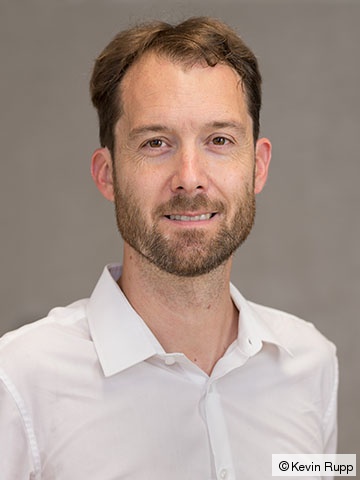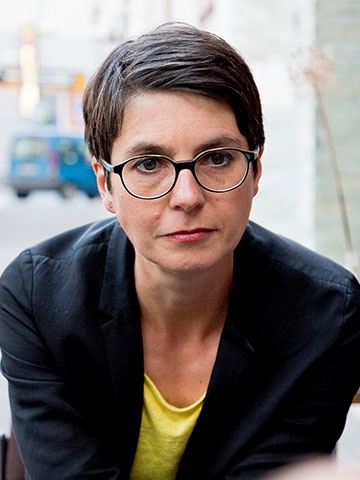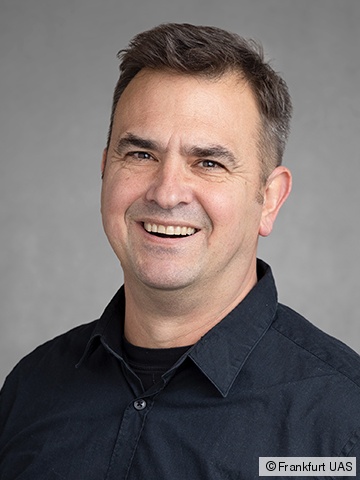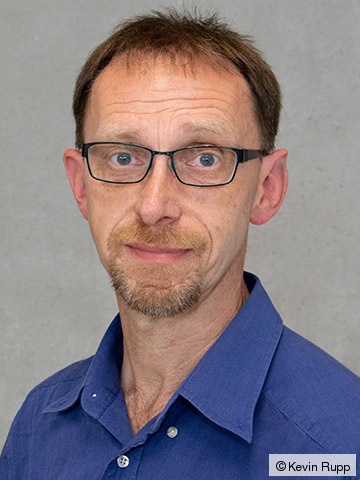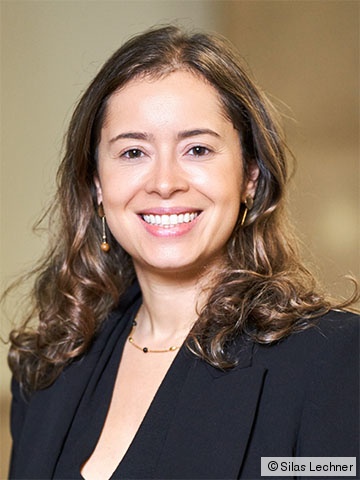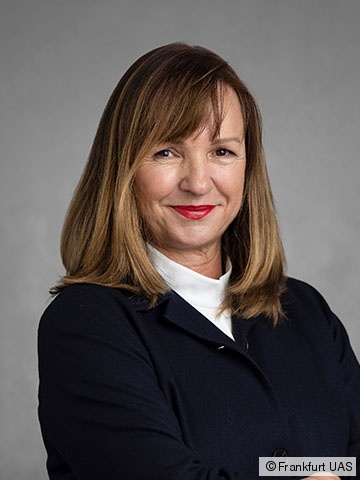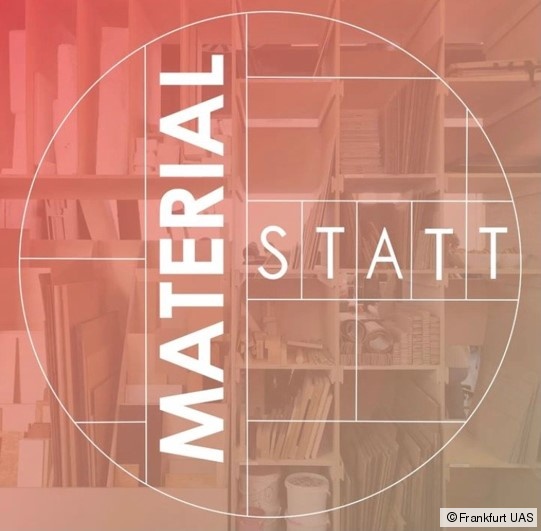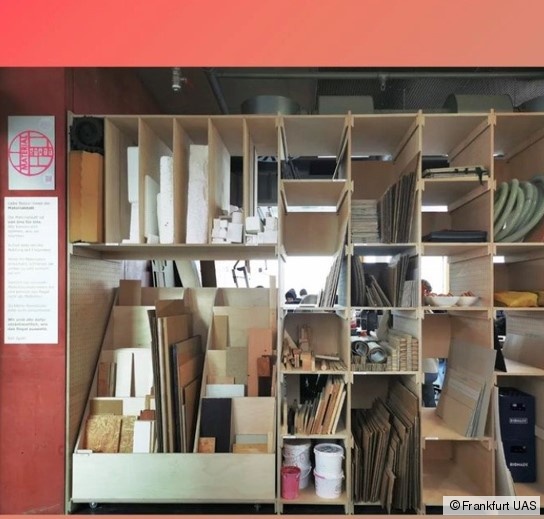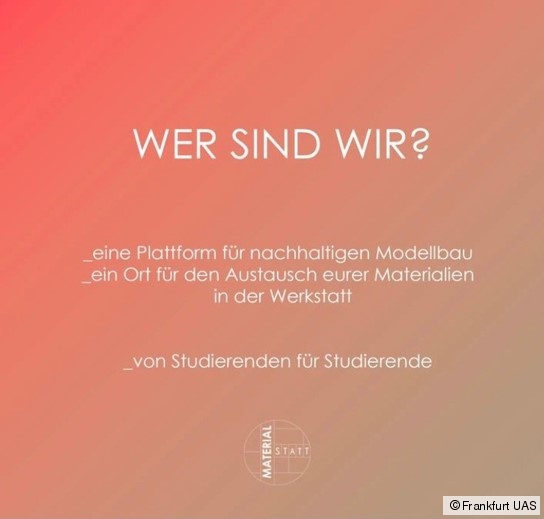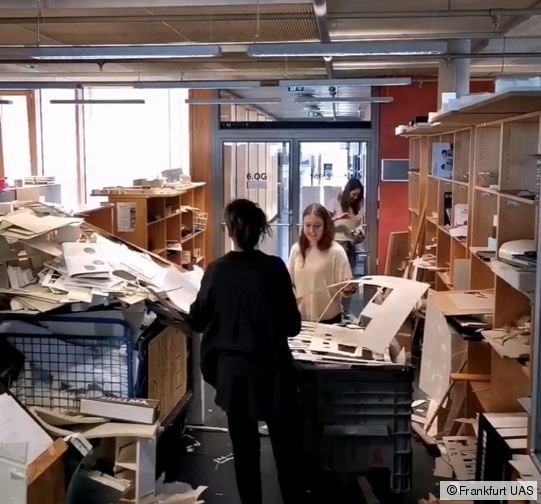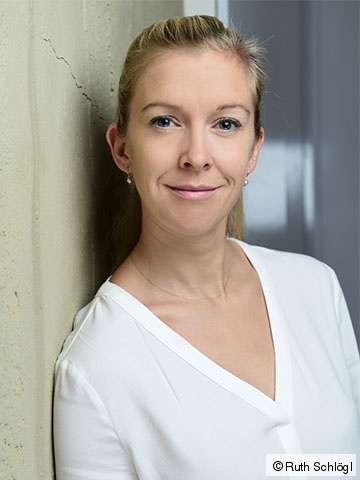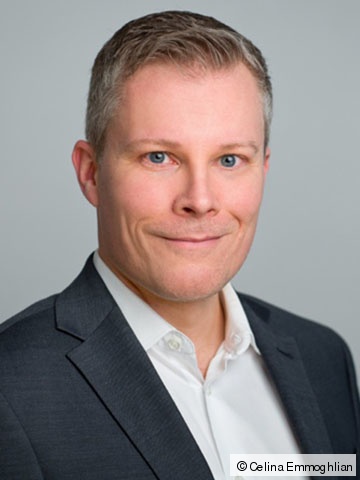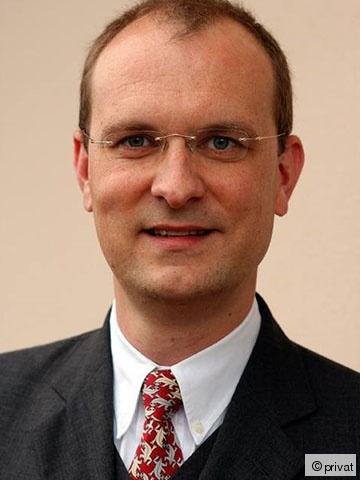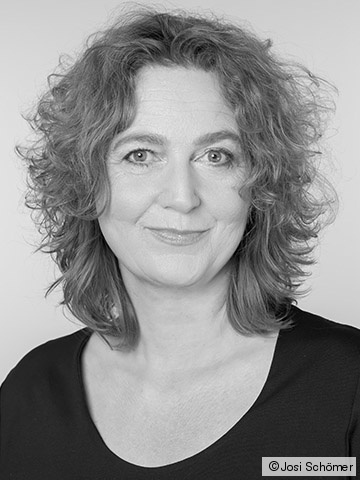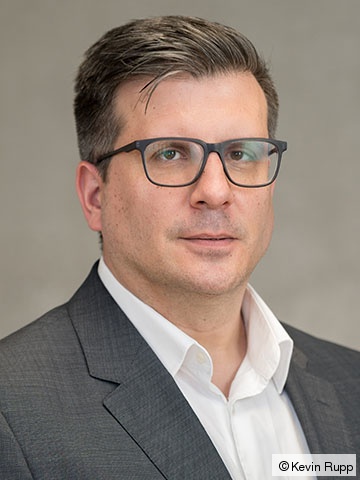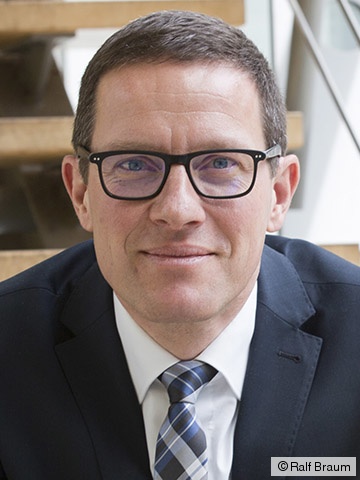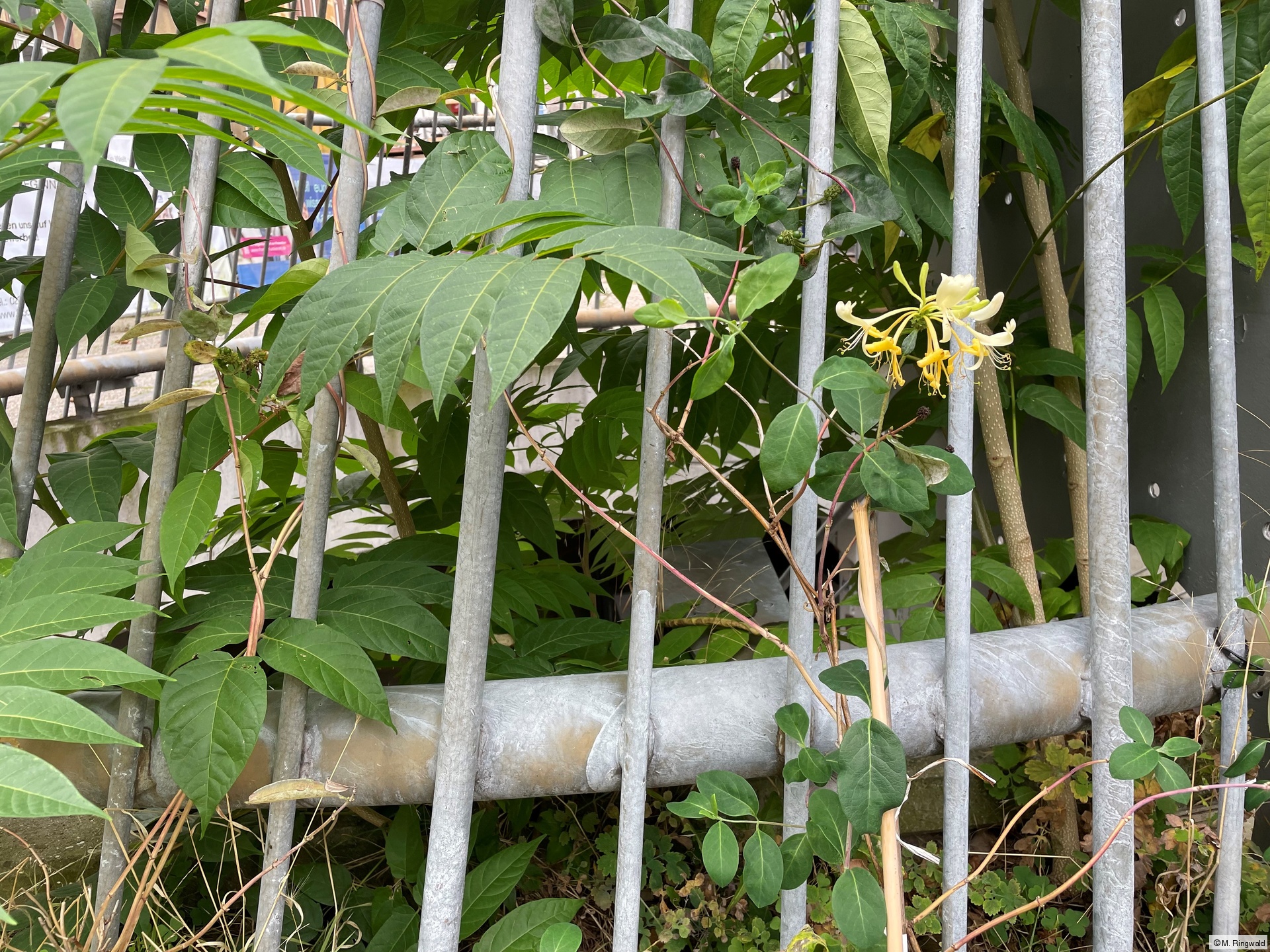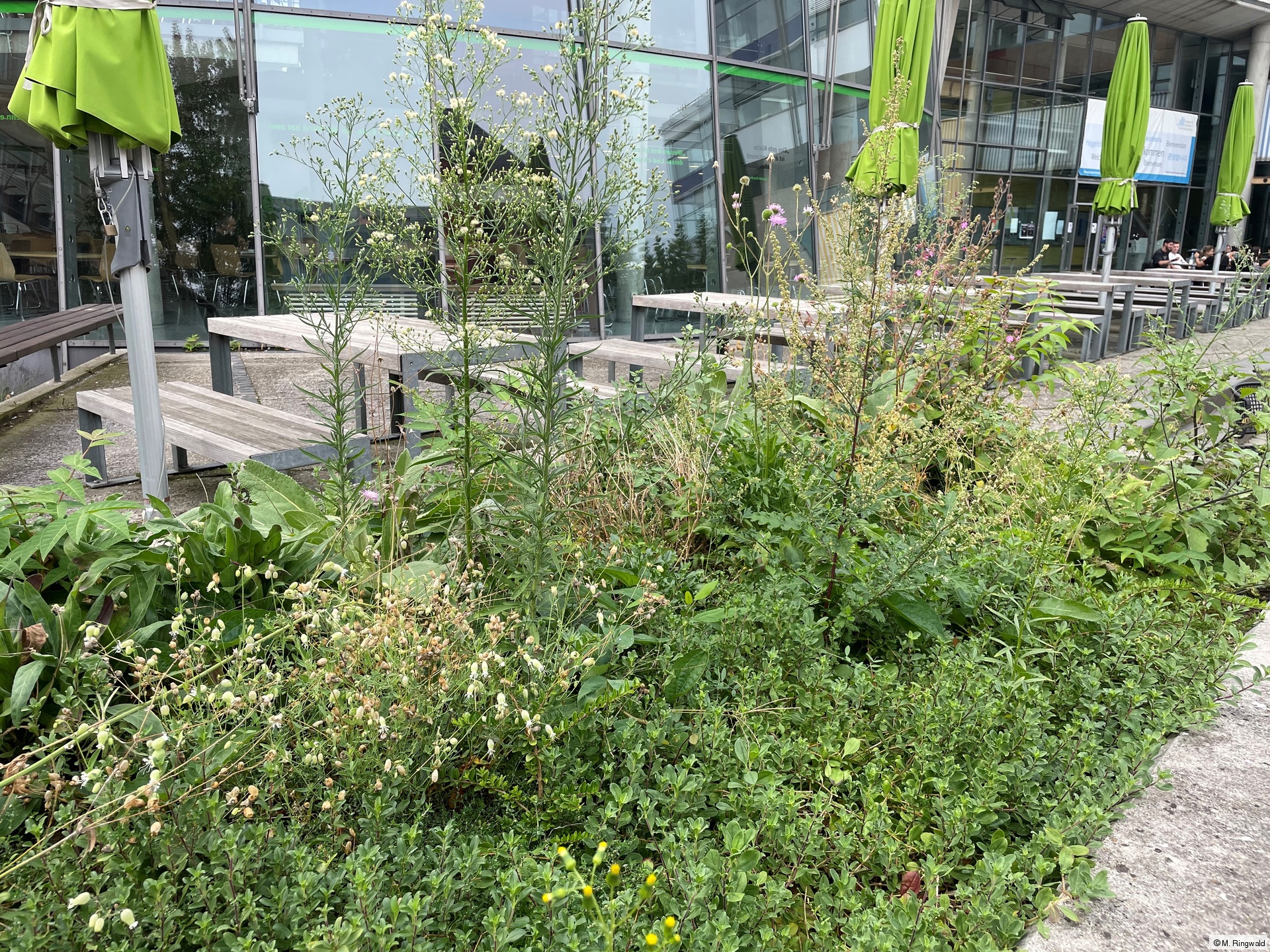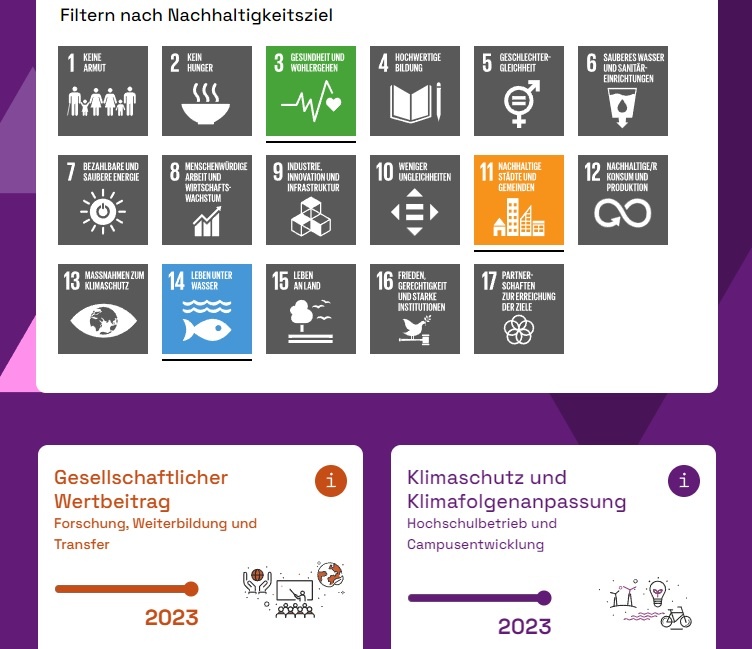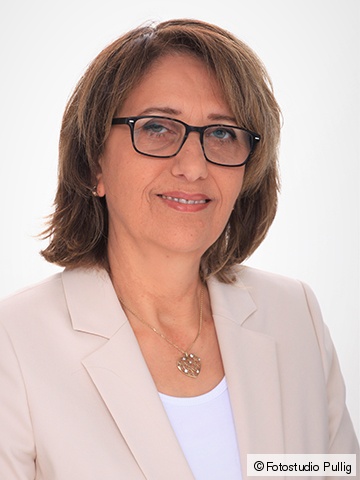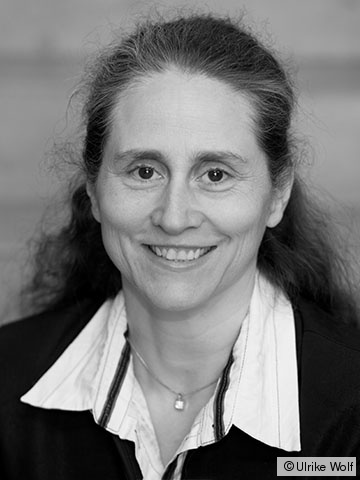Buero N| Strategy | Sustainability Council | Sustainability Professors | VisibleN | Events | Bee sponsorship
VisibleN | Making sustainability visible
In order to make sustainability activities at Frankfurt UAS visible and tangible both internally and externally, high-profile (student) model projects have been and are being carried out.
The teaching-research project “Planetary Future Lab - Exchange for an eco-social future” aims to bring together different actors such as neighborhoods, social services, businesses and social movements to strengthen eco-social resilience and community. It creates a transprofessional space for the exchange of initiatives that are committed to a sustainable future. The project brings together stakeholders from Frankfurt and the Rhine-Main region, promotes synergies and develops sustainable infrastructures for cooperation with students from all faculties.
Students are actively involved in the project and learn from innovative players, expand their knowledge and make contacts for future career opportunities. The project will result in a brochure with profiles of the players, stakeholder mapping and sustainable networking.
In the dual study program Applied Nursing Science, students are trained in practical exercises to implement hygiene guidelines to prevent infection, e.g. the sterile opening of packaged material for wound care. Each exercise requires a certain amount of packaged material, which must be purchased regularly. This generates a lot of waste, as the material has to be disposed of each time.
With a machine specially purchased for this purpose, the material can be shrink-wrapped again and reused for further exercises, as the materials for exercises on manikins do not actually have to be sterile. The device will also be used for the midwifery science course. The aim is to teach students a sustainable approach by integrating aspects of resource conservation into teaching.
As part of the project “Grey Energy Atlas Frankfurt”, under the direction of Prof. Dr. Florian Mähl, students of the Master of Architecture, building on the seminar “Material and Energy” in winter semester 2023/2024, examined a number of buildings on the campus of the university and in the city of Frankfurt for the grey energy “built into” them.
For the atlas, the amount of (non-renewable) primary energy and greenhouse gas emissions generated for the creation of the existing building fabric in its life cycle to date will be determined for four buildings (Buildings 2 and 8 on the Frankfurt UAS campus, Labsaal and Neue Mensa on the Bockenheim campus of Geothe University) and summarized in a final publication. The aim is to provide laypersons and decision-makers with concrete figures to facilitate the discussion about preservation or demolition.
Urban planning models are often made of non-decomposable materials. In order to enable the more sustainable construction of working models in future courses at Frankfurt UAS, Prof. Dr Jan Dieterle and Prof. Dr Natalie Heger are planning the ‘Model Construction Kit for Urban Planning’ in basic subjects of urban planning and architecture.
The building blocks, made from recycled wood, can be assembled into working models on a scale of 1:1000 as required. Without the effort of procuring materials and cutting them to size, students can playfully approach the aspects of urban design, try out different variants and record them photographically. The aim is to massively reduce the amount of waste, especially from Styrodur and glued wooden base plates.
The aim of the student project led by Prof Hans Jürgen Schmitz, was to develop a package of measures as part of the university's sustainability strategy to reduce energy requirements and CO2 emissions. This was to be achieved through measures that were as simple and quick to implement as possible, primarily in the area of measurement-control-regulation of the buildings. The elaboration was based on solution approaches that were developed as part of an elective subject for individual areas of building operation at Frankfurt UAS.
In the “CO2-Parcours” project, a carbon footprint calculator was developed and implemented under the direction of Prof. Gabriela Alves Werb, which asks a manageable number of questions in the areas of mobility, accommodation, nutrition and consumption. The results are presented at the end using practical comparisons so that users can better understand their generated emissions compared to others. The results are stored anonymously.
It was initially used as part of the Frankfurt UAS presence on the EURO24 fan mile. The aim is also to implement it in the university's sustainability dashboard.
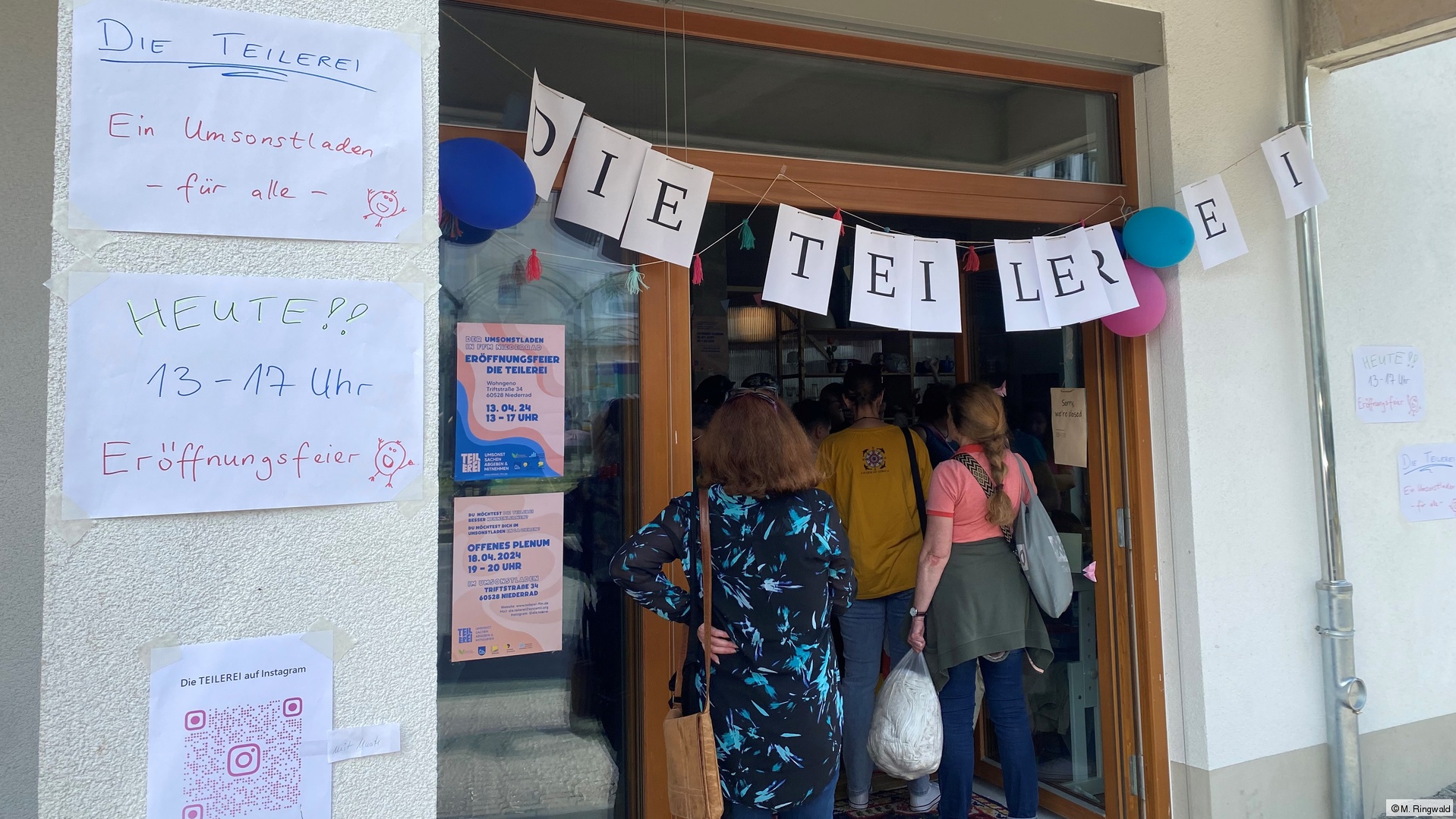
The project ‘Die Teilerei’ is a ‘free shop’ organised by the Zero Waste Lab of the FES. Prof Dr Erika Graf is involved on the Frankfurt UAS side. Die Teilerei is a place where everyday items (e.g. clothes, books, stationery, household goods or games) can be handed in and taken away for free. Items are given a second chance, which conserves natural resources. The university is funding a student assistant in the project for six months.
More information on Instagram.
Student initiative for the responsible use of resources
As part of the Materialstatt project, led by Ruth Schlögl, Prof. Dr. Natalie Heger and Patrik Palmu (Head of the FB 1 Model Making Workshop), student assistants in the Architecture teaching unit at FB 1 have built a material shelf in which materials are collected and made available for reuse. It is an initiative for sustainability, conscious use of resources and material diversity in model making at Frankfurt UAS. Whenever old models are no longer needed, when leftover materials are produced during model making, when so-called "waste" is generated somewhere at the university, the materials can be saved from the garbage can by the Material Shelf initiative.
The material is cut into practical formats, sorted and made available on the material shelf for further use. The task of the student assistants included the planning and construction of the actual material shelf and subsequently the maintenance and organization of the materials and shelf contents. In addition, there is communication to make the material shelf better known and to create greater awareness of the use of resources among teaching staff, employees and students.
Follow Materialstatt on Instagram.
To the project poster (in German).
The online symposium "Decolonizing Relationships: Ecosocial Transformation in Social and Educational Practice" took place on November 12 and 13, 2023. The event aimed to bring new voices, approaches and methods at the intersection of ecosocial transformation and diversity to the nationwide professional public. Under the direction of Prof. Dr. Yari Or and Prof. Dr. Chaitali Das (among others), lectures and workshops were held on various aspects of diversity in ecosocial transformation, e.g. anti-racist and diversity-sensitive projects, ecological justice or diversity-conscious methods and practices of ecosocial transformation. The event was a relevant platform for exchange and networking for the 180 or so people attending, who represented the diversity of communities in Germany, in order to work together for a just and inclusive eco-social transformation. At the end of the conference, the practical book "Decolonizing Transformation" was presented, which was designed as a guide for professionals with examples, case studies and reflections.
As a basis for the future design and greening of the campus, Faculty 1: Architecture - Civil Engineering - Geomatics at Frankfurt UAS is carrying out the student project Campus Mapping. Using various techniques - such as mapping, recording user behaviour, pathway networks, photographs and drawings, tree vitality measurements and thermal images - the campus is being mapped, documented and visualized. The project is coordinated and led by Prof. Dr. Jan Dieterle and Ruth Schlögl, in collaboration with tutors from the Bachelor's degree course in Urban Planning. The aim is to document the current state of the campus from different perspectives in order to create a broad basis for planning the campus design and to support the moderation of different ideas, interests and needs. The maps, images and data produced will be used for future campus design processes.
The results of the project have been published in a brochure (in German).
To the project poster (in German).
As part of the Green Coding @ Frankfurt UAS project, Prof. Dr. Jörg Schäfer and Prof. Dr. Martin Simon (both Faculty 2) are developing a framework for reliably measuring the carbon footprint of training processes on the university's computing cluster, which is currently under construction and is being funded by the Federal Ministry of Education and Research (BMBF) as part of the KI@FH-Nachwuchs initiative. Such a framework will not only contribute to the university's sustainability transparency, but also offers interesting prospects for use in courses with a focus on green coding. This is not just about teaching technical skills, but also about gaining a deep understanding of the ethical, social and environmental impact of AI. Current algorithms require massive computing power for their training, which results in a non-negligible and rapidly growing CO2 footprint.
To the project poster (in German).
The sustainable DesignBuild project Welcome Harbour for Culture and Integration, under the direction of Prof. Dipl-Ing. Tatjana Vautz, creates space and community for refugees. Students at Frankfurt University of Applied Sciences worked intensively on the development and implementation of the project. The result: a 1:1 scale construction that creates flexible spatial structures for social interaction.
The collaboratively developed, flexibly pluggable elements, made from recyclable and renewable materials, can be reproduced, arranged in different ways and used as required - for learning, working, playing or relaxing. The project therefore covers all sustainability criteria - it is socially, economically and ecologically sound.
In everyday university life, the six elements served as a welcome learning space for students on the gallery in Building 1. At the Festival of Democracy at Frankfurt UAS on May 23, 2023, visitors were able to contribute to the furnishing of the "Welcome Harbour" during a textile workshop within the construction by sewing upholstery covers and small fabric fish from discarded campus flags, which are to "travel on" with the installation as toy equipment, including to the praxistage.HOLZ event at the Zentrum Holzbau Schwarzwald in Menzenschwand, Germany. The event praxistage.HOLZ at the Zentrum Holzbau Schwarzwald in Menzenschwand in September 2023, where students and technical school pupils got to grips with the recyclable construction, while interested social institutions were able to experience the flexible use of the room modules.
To the project posters: Welcome Harbour - Textilworkshop, Welcome Harbour - Textile Workshop (Engl.), Welcome Harbour on the Road
The EcoDesign teaching project is about analyzing the entire life cycle of an everyday object using the example of a toaster, from production and use through to recycling and disposal, with the aim of optimizing product design primarily from an ecological, but also from an economic and technical perspective. The core is to anticipate the processes that take place with and in a product and their effects in all product life phases and to select, design and optimize them from the point of view of environmental and resource compatibility. The user's interaction with the product, which in turn depends heavily on the design of the human-product interface, and his or her appreciation of the product play an important role here.
GreenKart Campus
The aim of the project is to document the development of the campus with a view to increasing biodiversity. By mapping the sealed, unsealed and greened areas, the sealing, unsealing and greening can be recorded and documented. The mapping is based on digital orthophotos (DOP), i.e. distortion-free, georeferenced aerial photographs. These are true to scale and, depending on their ground resolution, can be used directly for mapping.
DOPs are produced by the HVBG for the whole of Hesse with a ground resolution of 20 cm (DOP20) in 4 color channels (multispectral, i.e. red, green, blue, near infrared). In the near-infrared range, living vegetation reflects the incident light particularly well; therefore, infrared aerial photography plays an important role for all information on the state of vegetation.
The Surveying Office of the City of Frankfurt also has digital orthophotos, which are taken annually for the Frankfurt city area. These aerial photographs are available with a ground resolution of 10 cm.
The image flights of almost all providers are primarily carried out in the period January-February, at a time of year when the terrain is not yet covered by tree foliage. This makes it easier to map the ground surfaces.
The condition of the UAS campus will initially be recorded and mapped within a GIS environment for 2021 and 2022 based on existing data from the HVBG and Stadtvermessung Frankfurt. From spring 2023, the condition of the greenery can be recorded annually with higher resolution multispectral data using our own UAV flights. This will make it easier and more accurate to record green facades in particular. This should also simplify the recording of surface materials on the campus.
Since the coronavirus crisis, delivery networks have been robust and handle large delivery volumes. While online retailers are benefiting from the crisis, retailers in cities and municipalities that are not critical of the system have had to close to the public and offer a rudimentary, self-organized delivery service. In Darmstadt, from May 2020 to December 2020, a prototype bike delivery service was set up with the integration of local retailers and current cargo bike solutions and empirical research was conducted on the acceptance of such a delivery service by suppliers (retailers), bike couriers and customers.
In order to investigate the transferability of this concept for the Nordend district of Frankfurt, a communication and marketing concept will be developed and the transfer of the concept already applied in Darmstadt will be tested for the first time and regional modification requirements will be identified.
In the "Wasteland" educational project, bulky waste serves as a valuable material resource for the construction of musical instruments at the Museumsuferfest in August 2022. Student assistants from the BüroN led children in crafting and talked to them and their parents about sustainability. Parents and other adults were able to take part in the sustainability quiz and take home a small prize as an "incentive for sustainability" if they named the correct solution word.

The Tiny-Studio-Lab is a REACT-EU /EFRE project funded by the European Union. From April 2023, the Tiny-Studio-Lab has made it possible to test concepts and prototypes from research and development for buildings on a 1:1 scale under real conditions. This test building also offers the opportunity to show systems and components in operation and for students to try out new ideas together. The Tiny Studio Lab thus promotes the more sustainable planning, construction and operation of buildings and provides an environment for experiments and new developments that can also be transferred to university operations and campus development.
The building's facade elements will be interchangeable so that new wall structures can be tested regarding different criteria. For example, it is planned to test a module with facade-integrated ventilation and a module with a green facade combined with PV elements. In addition to cooling and ventilation, light and acoustics will also be analysed. A reversible air-to-water heat pump, an air-conditioning system and a PV system as well as sophisticated measurement technology are integrated into the building.
For more information (in German): Tiny-Studio-Lab.
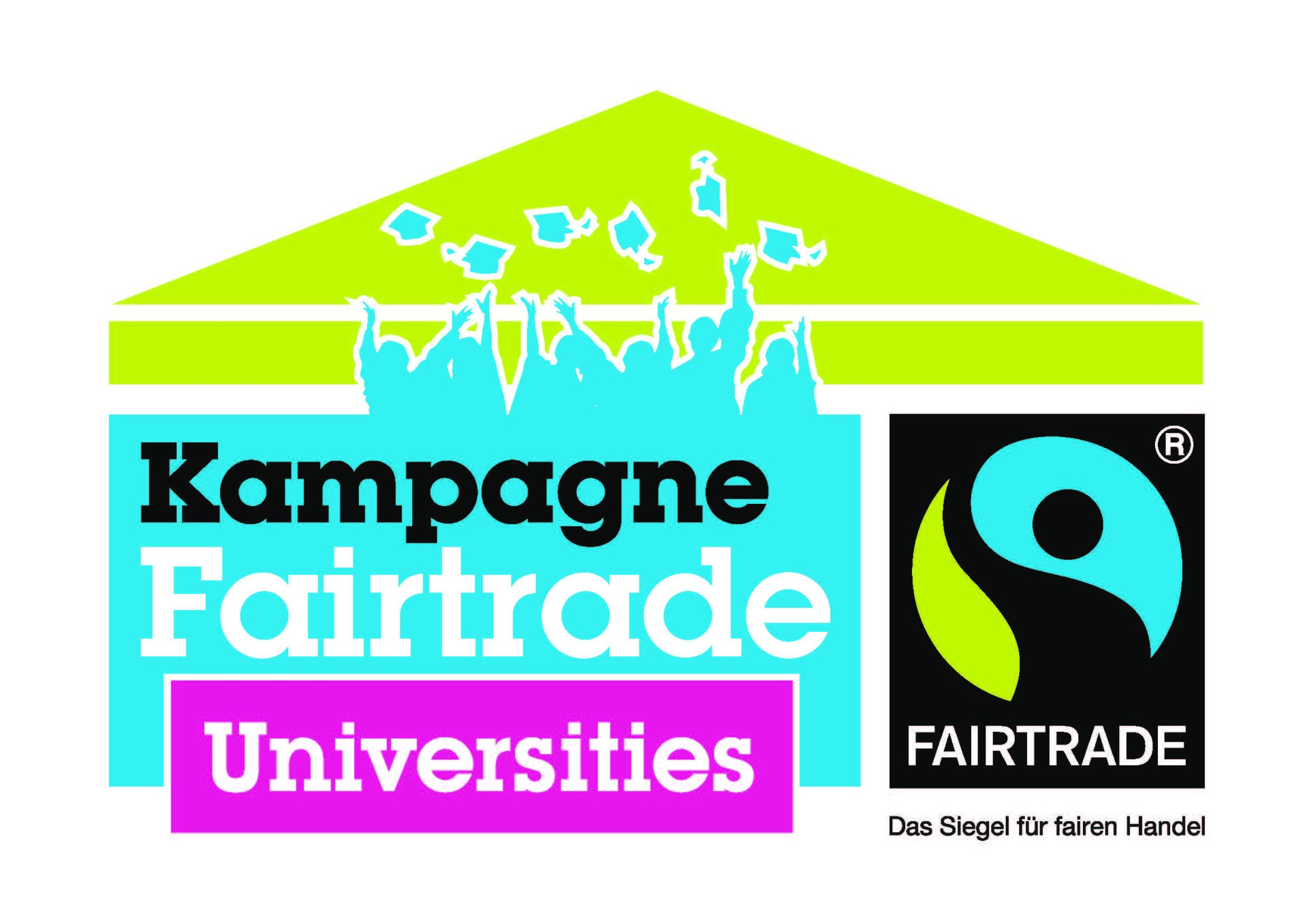
Frankfurt UAS has been the official title holder since the end of January 2022. The university was the first among the universities in Hesse to adopt its own sustainability strategy and is now also the first in Hesse to be allowed to call itself a Fairtrade University.
For more information (in German): Fairtrade University
As species extinction is one of the greatest challenges for future generations and life on earth alongside climate change, we are addressing the issues of campus greening and increasing biodiversity on campus. This includes, for example, the establishment of bee colonies, the installation of insect hotels and the unsealing of surfaces. Students have dealt with this topic in courses of the Interdisciplinary General Studies (ISG) in the teaching module "Sustainability Strategy of Frankfurt UAS - think globally, act locally", among others, but also drafts from other courses dealt with the topic of campus greening and increasing biodiversity. These drafts and ideas, as well as suggestions from the company suggestion scheme (BVW) and individual measures from the list of 111+ measures, are being incorporated into a study on campus greening and increasing biodiversity. The study explores the options for greening the outdoor areas, including the facades. The aim is to increase biodiversity on the campus and show potential for desilting, while still guaranteeing functional and building law requirements.

In order to increase biodiversity on campus, several bee colonies were established on the campus of Frankfurt University of Applied Sciences in June 2021. Bees, along with many other species, are important for the existence of ecosystems on our planet because they pollinate a large proportion of plants.
The idea for establishing the bee colonies was submitted as part of the company suggestion scheme and won an award. The search for a suitable location was carried out as part of the Interdisciplinary General Studies (!SG) as a project on the cross-cutting topic of sustainability. Colleagues from Facility Services, the safety officers and the people who submitted the proposal supported the team in choosing the location. The project was funded by the Förderverein der Frankfurt UAS e.V. Many thanks to everyone involved!
A green roof on building 4 of Frankfurt UAS was chosen as the location. The bees can be observed from the stairwell of Building 4 from the 2nd floor.
The raised bed in front of the cafeteria and the bed on the side of the children's house will soon be richly laid for pigeon-tails, blood droplets and co. The planting campaign is part of the "Nectar Bar" project to save the biodiversity of day and night butterflies, which won the 1st Frankfurt Biodiversity Ideas Competition. Our university was able to initiate a cooperation here, so that in April 2024 the graduate biologist and botanist Monika Peukert and Christoph Schuch, Managing Director of Landschaftspflegeverband Main-Taunus e.V. and founder of the Herbs & Wild Perennials department at the Hattersheim Schlockerhof of EVIM Behindertenhilfe, personally came to the campus with large containers for "Nektar-Bar" and spent a day planting around 280 moth-friendly wild perennials - robust, native plants such as dost (also known as wild marjoram), silverleaf, night violet or nettle, which are a welcome source of food for moths and cope well with heat and drought. In May, the underground car park light well was also planted with climbing plants.
For more information on the Nectar Bar project (in German): https://nektar-bar.de/
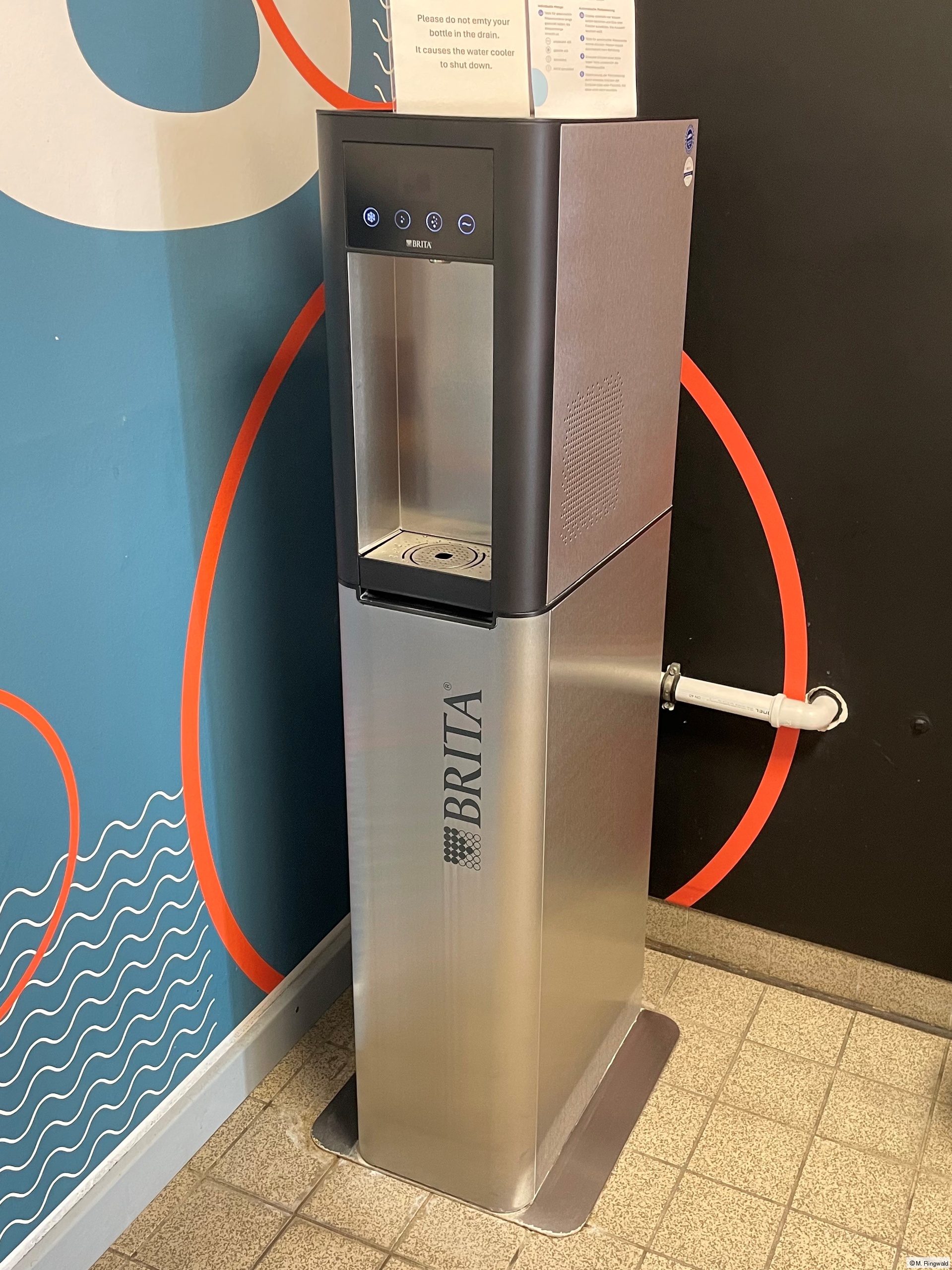
The drinking fountain is located in building 3, in the library.
Using the water station is inexpensive and saves CO2 emissions: Drinking water from the tap produces an average of 0.35g CO2 per litre. By contrast, 1 litre of water from a discount store produces 202.74g of CO2. That is 586 times more CO2 per litre than tap water! In Germany, an average of around 180 litres of bottled water is consumed per year. That's over 3 million tonnes of CO2 every year, even though tap water in Germany is regularly subject to strict testing.1
You can also find the exact location on Google Maps or using the following coordinates: 50.131225, 8.692331
1 Source: GUTcert Studie im Auftrag von a tip: tap e.V. (23.07.2024)

Since June 2024, the library has been providing an exchange shelf for academic books from all disciplines. It is located in the passageway between the counter area and the checkroom. There you can hand in textbooks and reference books that you no longer need and browse for new relevant ones. Just drop by!


